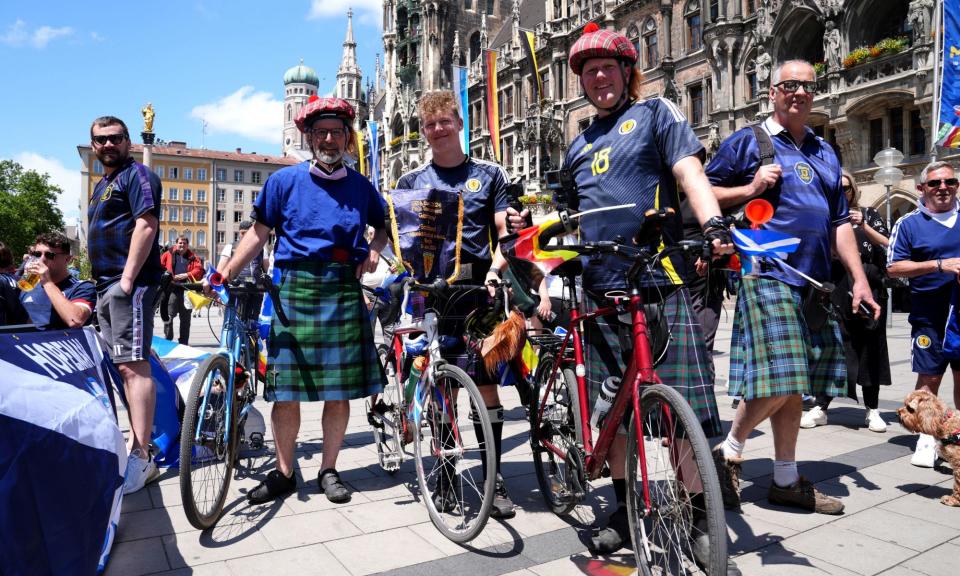‘It was the fear of missing out’: Scotland fans arrive en masse in Munich

The alarm was raised at about 9am on Thursday. The Glasgow airport bar sponsored by Scotland’s most popular lager had run out of its core product.
The explanation has no link to some early rush towards summer holidays. On Friday in Munich, Scotland’s national football team will play their first European Championship game outside of the UK since 1992. The identity of the opposition for that 3-0 win on 18 June was the CIS, essentially the Soviet Union, which nods towards all that has transpired during the intervening years.
Related: Prospect of becoming legends drives us, says Scotland’s Andy Robertson
John Carver, the Scotland assistant manager, speculated that 200,000 Scots could appear in Germany for their matches against the tournament hosts, Switzerland and Hungary. If the number feels disproportionately high relative to the population of Scotland – about 5.5m – it must be considered that expats are joining the party. Scores of them.
Flights from Australia have carried Scotland supporters. Mark Donaldson, an Edinburgh native, has travelled to Munich from Connecticut. “It was the worry and the fear of missing out,” he says. “It was the worry of seeing 20% of my class from school going, even having not seen some of them for decades. People do not want to watch on TV something that their mates will probably be speaking about for the rest of their lives.
“It’s about not being in your normal life when your pals are having the time of theirs in Germany. That’s why everybody wants to go. I just haven’t told the Mrs how much I have paid for these three Scotland tickets.”
There are also those who have done it all before. John Buchanan followed Scotland in West Germany at the 1974 World Cup as a 19-year-old student. Five decades on, he is back and in nostalgic mood. This marks Buchanan’s 12th tournament visit.
“The first, and probably most important, aspect of the 1974 trip was that travelling by plane was simply out of the question for punters like us,” he says. “Once the draw was made I spent the whole of the second and third terms in the University of Glasgow library with the Thomas Cook continental railway timetable, working out routes between games. I would eventually purchase an Interrail card for £38 for the month, although an error by the lady at Glasgow Central station had my card marked as 01/06/74 to 31/07/74. In 1974 there was a good Scotland following in West Germany, but remember in those days we took 65,000 to Wembley biennially.
“My late wife, Marie, was once asked why she went away for five days to watch Scotland. Her reply was that the match lasted only 90 minutes, but she saw places and met people that she would not have met on a beach holiday.”
Scotland’s support, nicknamed the Tartan Army, have a widespread reputation for good behaviour. They endear themselves to local people the world over. The team will encounter a culture shock in Munich. Scotland’s squad has a training base in the gorgeous south Bavarian town of Garmisch-Partenkirchen. While on nodding terms with shop owners during daily walks, players may well believe they are featuring in a recreation of The Sound of Music. Unlike in Munich, there are no fans in sight.
“We haven’t been in any major tournament outside of the UK since the World Cup 1998,” Donaldson says. “That’s a generational thing. A lot of my pals are taking their kids, guys who were there in 1998 are now bringing sons and daughters.”
There is extracurricular opportunity. AC/DC’s concert in Munich on Wednesday evening featured a smattering of Scottish accents in the crowd. Gary Martin from Ayrshire persuaded a pal during a recent drunken conversation at a wedding to run a 10k in Nuremberg; they will do so on Sunday, between Scotland’s games against Germany and Switzerland.
There are also causes to make sure Scotland’s Euros participation is a force for greater good. Through one of them, the charitable efforts of the On The Ball Academy, footballs will be distributed to every primary school class in Glasgow. “Giving kids a ball seems like a small gesture, but resources are stretched and these balls will be played with by thousands and thousands of kids, many of whom come from underprivileged backgrounds,” says the organisation’s founder, Ryan Docherty. “This is opening the door to the positive life experiences football can bring. It’s about so much more than just about finding the next Andy Robertson, although that would be great too.”
One fan, Craig Ferguson, received a hero’s welcome when arriving here in Marienplatz after walking 1000 miles from Glasgow over 41 days to raise funds for mental health charities. He was also, fittingly, sprayed with beer.

 Yahoo Sport
Yahoo Sport 






































